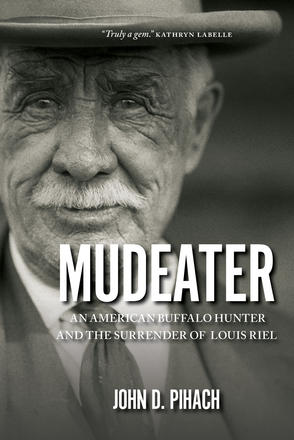
Mudeater
An American Buffalo Hunter and the Surrender of Louis Riel
Description
"A really interesting read. " Keith Carlson, author of The Power of Place, The Problem of Time
Born the son of a Wyandot Chief in Kansas in 1849, Irvin Mudeater was one of the last great frontiersmen of the American West.
Hired to run wagon trains to Santa Fe, Mudeater fought off "Indian attacks," was caught up in the Civil War, drove a stagecoach, and lived as a plainsman on the lawless frontier. Most of all, he was a buffalo hunter--killing 126 head in just one day.
In 1882, Mudeater moved to Canada, adopted the name Robert Armstrong, and portrayed himself as white. Shortly after the fall of Batoche, he played the lead role in bringing the fugitive Metis leader, Louis Riel, into custody.
John D. Pihach attempts to resolve the opposing stories of Riel's surrender/capture, scrutinizes the sensational incidents in Armstrong/Mudeater's life, and, with the inclusion of Mudeater's unpublished memoir, allows this consummate storyteller to speak in his own voice.
Reviews
"The story of how Mudeater became Armstrong sheds light on a key chapter in Canadian history during the country's sesquicentennial, as the country grapples with so many of the colonial legacies and questions of identity that Armstrong, or Mudeater, represented. " -- The Globe and Mail
". ..offers a very valuable glimpse into the life and mind of one elderly veteran of the American frontier. " -- Montana: The Magazine of Western History